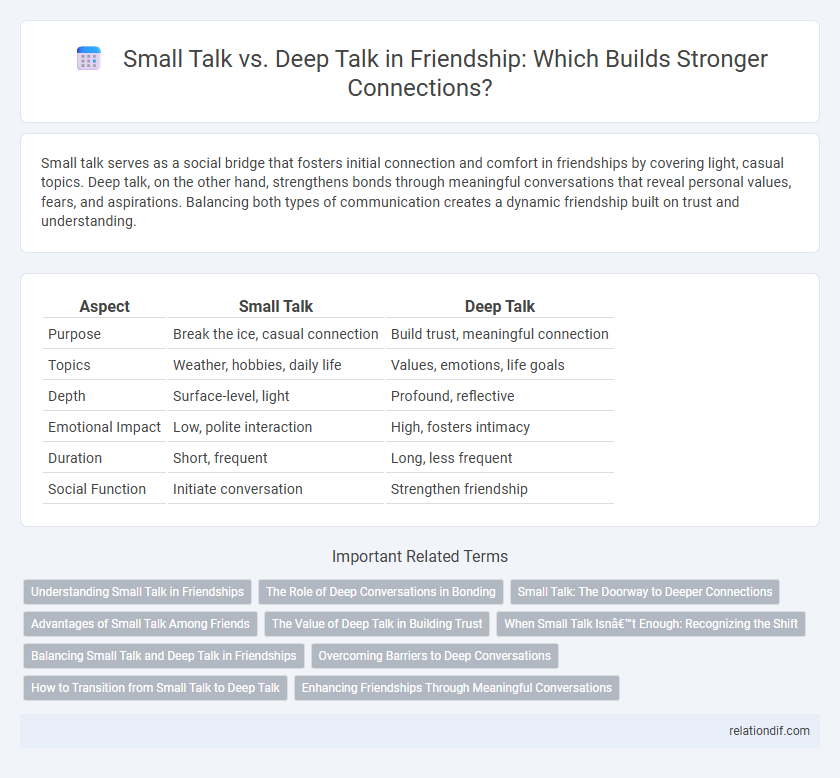Small talk serves as a social bridge that fosters initial connection and comfort in friendships by covering light, casual topics. Deep talk, on the other hand, strengthens bonds through meaningful conversations that reveal personal values, fears, and aspirations. Balancing both types of communication creates a dynamic friendship built on trust and understanding.
Table of Comparison
| Aspect | Small Talk | Deep Talk |
|---|---|---|
| Purpose | Break the ice, casual connection | Build trust, meaningful connection |
| Topics | Weather, hobbies, daily life | Values, emotions, life goals |
| Depth | Surface-level, light | Profound, reflective |
| Emotional Impact | Low, polite interaction | High, fosters intimacy |
| Duration | Short, frequent | Long, less frequent |
| Social Function | Initiate conversation | Strengthen friendship |
Understanding Small Talk in Friendships
Small talk in friendships serves as a social glue that fosters comfort and builds trust through casual, light-hearted conversations on everyday topics. This surface-level interaction creates opportunities to discover shared interests and emotional cues, paving the way for deeper, meaningful connections. Recognizing the value of small talk helps strengthen friendships by laying the foundation for empathy and open communication.
The Role of Deep Conversations in Bonding
Deep conversations play a crucial role in strengthening friendships by fostering emotional intimacy and mutual understanding beyond surface-level interactions. Engaging in meaningful dialogue allows friends to share personal values, experiences, and vulnerabilities, which builds trust and a stronger emotional connection. Research in social psychology highlights that relationships involving frequent deep talks tend to exhibit higher satisfaction and resilience compared to those limited to small talk.
Small Talk: The Doorway to Deeper Connections
Small talk serves as the essential foundation for building trust and comfort in new friendships, enabling individuals to gradually open up and share more meaningful experiences. By engaging in casual conversations about common interests or daily life, people create a safe environment that encourages vulnerability and genuine connection. This initial exchange of light topics often leads to deeper discussions, strengthening emotional bonds and long-lasting relationships.
Advantages of Small Talk Among Friends
Small talk among friends strengthens social bonds by creating a comfortable atmosphere that encourages openness and trust. It helps maintain regular communication, making interactions less awkward and more consistent. Engaging in light, casual conversations can also reveal common interests and foster positive emotions that enhance overall friendship quality.
The Value of Deep Talk in Building Trust
Deep talk fosters genuine connection and builds trust by allowing friends to share their true thoughts, emotions, and vulnerabilities. Unlike small talk, which often remains superficial, deep conversations create a safe space for understanding and empathy, essential foundations for lasting friendships. Trust grows as individuals reveal their authentic selves, strengthening emotional bonds and mutual respect.
When Small Talk Isn’t Enough: Recognizing the Shift
Small talk often serves as the initial step in building friendships, but recognizing when it isn't enough is crucial for deepening connections. Signs of this shift include a growing desire for meaningful conversations that explore personal values, emotions, and life experiences beyond surface-level topics. Engaging in deep talk fosters trust and intimacy, transforming casual acquaintances into genuine friends.
Balancing Small Talk and Deep Talk in Friendships
Balancing small talk and deep talk in friendships fosters both comfort and emotional intimacy, ensuring conversations are engaging yet meaningful. Small talk builds rapport and ease, while deep talk strengthens trust and understanding, creating a well-rounded connection. Mastering this balance enhances communication, promoting lasting and fulfilling friendships.
Overcoming Barriers to Deep Conversations
Small talk often serves as a social bridge, easing initial discomfort and establishing common ground in friendships. Overcoming barriers to deep conversations requires active listening, empathy, and asking open-ended questions that encourage vulnerability. Creating a safe environment where trust is prioritized allows friends to move beyond surface-level topics and foster meaningful connections.
How to Transition from Small Talk to Deep Talk
Transitioning from small talk to deep talk involves asking open-ended questions that invite personal reflection and sharing, such as inquiries about values, passions, or life experiences. Observing the other person's verbal and nonverbal cues helps determine their comfort level with deeper subjects, allowing for a natural progression in conversation. Gradually introducing meaningful topics creates a safe space for vulnerability, strengthening the bond and fostering genuine friendship.
Enhancing Friendships Through Meaningful Conversations
Engaging in deep talk fosters trust and emotional connection, laying a stronger foundation for lasting friendships than small talk alone. Meaningful conversations about personal experiences, values, and feelings enhance empathy and mutual understanding. Prioritizing depth in dialogue transforms casual acquaintances into genuine, supportive friendships.
Small talk vs Deep talk Infographic

 relationdif.com
relationdif.com